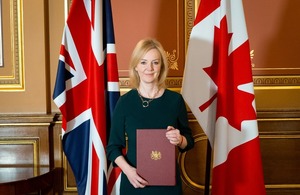Press release
The signing comes after both countries last month announced an ‘agreement in principle’ to roll over current trading arrangements

- The UK and Canada have today signed a trade agreement in Canada.
- Today’s agreement secures transatlantic trade with a trading partnership worth £20 billion last year.
- Both countries to negotiate a new, tailor-made UK-Canada trade deal in 2021.
The UK’s Deputy High Commissioner for Canada David Reed, and Canadian Deputy Minister of International Trade John Hannaford have today (Wednesday 9 December) signed the UK-Canada Trade Continuity Agreement in Ottawa.
The signing comes after both countries last month announced an ‘agreement in principle’ to roll over current trading arrangements and begin negotiations on a new, bespoke UK-Canada trade deal in 2021.
Today’s agreement gives certainty for UK businesses exporting goods and services to Canada worth £11.4 billion. The trade deal supports British industries including automotive manufacturing and food and drink, which between them provide jobs for more than half a million people across the UK.
Overall, an estimated £42 million tariff burden on UK exports has been saved. The benefits locked in under the agreement signed today include:
- Future zero tariffs on UK car exports to Canada, which were worth £757 million last year, supporting factories and jobs in our communities. Without this agreement, Canada’s standard tariffs on cars of 6.1% would apply.
- Tariff-free trade on 98% of goods that can be exported to Canada including beef, fish and seafood and soft drinks.
- UK producers will continue to benefit from zero tariffs on many agricultural and seafood exports including chocolate, confectionary, fruit and vegetables, bread, pastries and fish. Last year the UK exported £344m worth of agri-food goods to Canada.
- Without the continuity agreement, Canadian food products such as maple syrup, biscuits and salmon could have been more expensive for British consumers as they would face taxes of up to 8% when entering the UK under the UK Global Tariff.
International Trade Secretary Liz Truss said:
This is a brilliant deal for Global Britain. It secures £20bn worth of trade with a friend and ally that shares our commitment to free enterprise, democracy and free trade. It provides certainty for car and food and drink exporters in particular, and paves the way for a more advanced deal that goes further and faster in modern areas like digital and data, women’s economic empowerment and the environment.
The deal also takes us a step closer to joining the Trans-Pacific Partnership, a high standards agreement of 11 dynamic Pacific nations. Membership would deepen market access for our businesses, help turn us into a global hub for tech and services trade, and strengthen the global consensus for rules-based free trade.
All nations and regions will benefit from preferential access to Canadian markets. For example, together the West Midlands and North West regions exported over £1.2 billion worth of goods to Canada last year, while Scotland and Northern Ireland collectively exported £1 billion.
In under two years, the UK government has agreed trade deals with 55 countries accounting for £170 billion of UK bilateral trade.
Notes to Editors:
- The Agreement text will be laid in the libraries of both Houses alongside an accompanying Explanatory Memorandum and a Parliamentary Report. They will also be published on the gov.uk website.
- Total trade between the UK and Canada was worth £19.9 billion in the four quarters to end of Q1 2020
- The UK will continue to be covered by the EU-Canada FTA during the transition period. This agreement will come into effect on 1 January 2021.
- Source of statistics on trade with Canada: ONS UK Economic Accounts, Q2 2020 release.
- Source of regional trade statistics: HMRC Regional Trade in Goods, Q2 2020 release.
Published 9 December 2020
Follow this news feed: HM Government





